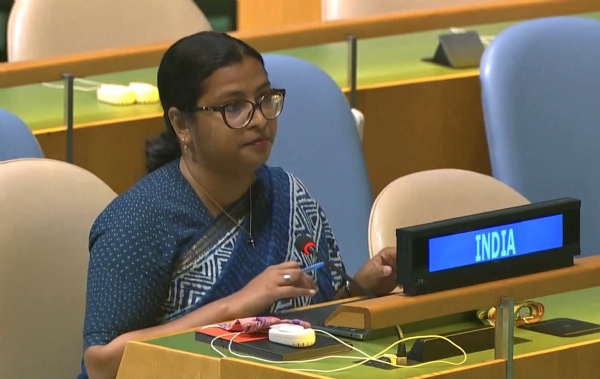Pakistan continues to foment a culture of violence at home, across its borders: India slams Pak at UN
India"s strong response came after Islamabad"s envoy to the UN Munir Akram raked up the issue of J&K .
Total Views | 109
New Delhi, September 08: Charging the attacks on Pakistan for using the United Nations platform to make hate speeches against the nation, India said that Islamabad fosters a "culture of violence" both inside and outside its borders.

Speaking during the high-level forum on the Culture of Peace convened by the President of the 75th Session of the UN General Assembly, Indian diplomat Vidisha Maitra said, "A Culture of Peace is not just an abstract value or principle to be discussed and celebrated in conferences, but needs to be actively built into global relationships between and among member states."
While responding to comments made by Islamabad's envoy to the UN Munir Akram, Maitra added, "We have witnessed yet another attempt today by the delegation of Pakistan to exploit a UN platform for hate speech against India, even as it continues to foment a 'culture of violence at home and across its borders. We dismiss and condemn all such efforts."
It should be noted that Munir Akram, raked up the issue of Jammu and Kashmir and spoke about the late pro-Pakistan leader Syed Ali Shah Geelani in his remarks in the General Assembly hall than focussed almost entirely on India and not on the forum's theme.
Maitra stated that terrorism, which is a manifestation of intolerance and violence, is the antithesis of all religions and cultures. She further said that the world should be concerned about terrorists, who use religion to justify their activities and those who support them in this quest.
She emphasized India would continue to spread its message of humanity, democracy, and non-violence, and repeated the country's call for the application of the principles of objectivity, non-selectivity, and impartiality to steer discussions at the United Nations, particularly on religion.
"The United Nations, including UN Alliance of Civilizations and the Member States, should refrain from selectivity on such issues which hinders a Culture of Peace," said Maitra.
While noting that the COVID-19 pandemic has revealed how interconnected and interdependent humankind is, Maitra added that even during the pandemic, there has been an increase in intolerance, violence, and terrorism. "Even in the midst of the pandemic, we face the 'infodemic' challenge which has been responsible for a rise in hate speech and seeding hatred within communities," the Indian diplomat told the high-level forum.
The Culture of Peace is based on the principles of democracy, pluralism, compassion, cultural diversity, dialogue, and understanding, she added. While referring to a speech given by Swami Vivekananda at the Parliament of World Religions in Chicago in 1893, Maitra said: "India is called a country of 'unity in diversity. Our concept of pluralism is based on our ancient ethos of 'Sarva Dharma Sambhav' which means 'equal respect for all faiths."
"India is not just the birthplace of Hinduism, Buddhism, Jainism, and Sikhism, but is also the land where the teachings of Islam, Judaism, Christianity, and Zoroastrianism have taken strong root," she said.
"Culture of Peace is the cornerstone of any global order to build inclusive and tolerant societies. Since the adoption of the UN Declaration and Programme of Action in 1999 at Bangladesh's behest, the Culture of Peace agenda has provided an effective blueprint for multilateral action to promote solidarity and understanding," added Vidisha Maitra.
.
.





